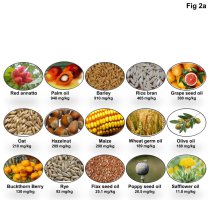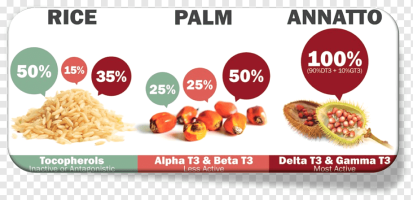I have already created this thread on ggenereux.blog, I duplicate it here.
There is another NON-Peat substance that is given little attention. I remember how in one interview Ray spoke negatively about the addition of tocotrienols and said that it causes an increase in the liver
Tocotrienols are such antioxidants, they belong to the vitamin E family. But the problem is that they are unsaturated and can easily be oxidized. And I am sure that their oxidized metabolites can create problems.
I have noticed that some people have problems with seemingly safe foods, such as coconut oil and olive oil. Someone is experiencing problems only with unrefined coconut oil. I myself, it seems, reacted to cocoa butter for a long time, but I could not understand what was wrong.
Looking through the studies on tocotrienols, I got the impression that someone is trying hard to prove their safety/benefit to us, but I was still able to find some studies that prove their harm.

 pubmed.ncbi.nlm.nih.gov
pubmed.ncbi.nlm.nih.gov
"Indiscriminate application of organophosphate (OP) pesticides has led to environmental pollution and severe health problems. The aim of the present study was to evaluate the effect of palm oil tocotrienol-rich fraction (TRF) on biochemical and morphological changes of the liver in rats treated with fenitrothion (FNT), a type of OP pesticide. A total of 28 male Sprague-Dawley rats were divided into four groups; control group, TRF-supplemented group, FNT-treated group and TRF+FNT group. TRF (200 mg/kg) was supplemented 30 minutes prior to FNT (20 mg/kg) administration, both orally for 28 consecutive days. Following 28 days of treatment, plasma biochemical changes and liver morphology were evaluated. The body and absolute liver weights were significantly elevated in TRF+FNT group compared to FNT group. TRF administration significantly decreased the total protein level and restored the activity of alanine aminotransferase (ALT) and aspartate aminotransferase (AST) in TRF + FNT group."

 www.ncbi.nlm.nih.gov
www.ncbi.nlm.nih.gov
Here the mice were given diets with a lot of carbohydrates (corn starch) , a lot of fats, a lot of carbohydrates or fats + tocotrienols. Interestingly, the mice in the high-fat group had huge problems compared to the high-carbohydrate group (just look at the tables) . The fat + tocotrienol group had better health than fat. They did not specify the source of fat in the diet, and I suspect that it was a lot of PUFA, such as flaxseed oil. It is logical that antioxidants, even such as tocotrienols, will protect against PUFA. But I was interested in comparing the high-carbohydrate group with and without tocotrienols (although I think they also had a lot of PUFA in their diet). And, they didn't write it in the review !! Mice with tocotrienols had less muscle mass, more abdominal fat, a higher visceral obesity index, higher cholesterol and a slightly larger liver mass (with a smaller total weight).
In addition, in almost all studies, mice/people are given tocotrienols with alpha-tocopherol (although it is known that it blocks the adsorption of tocotrienols). And I notice that the higher the percentage of alpha-tocopherol, the better the results.
Conditions that (I assume) may be directly or indirectly related to tocotrienols:
problems with teeth,
restless legs syndrome,
visceral fat,
fatigue,
bad mood (depression),
nausea,
excessive hairiness,
problems with gaining muscle mass,
NAFLD,
Beri-beri
If you experience any other symptoms after consuming coconut oil, etc - add to the list
So I just made a list of tocotrienol foods.
Main Sources: Annatto, palm oil, coconut oil, cocoa butter, safflower oil, olive oil, barley, rice, oats, corn, wheat, rye (usually the least), hazelnuts (generally all nuts). Also eggs(Tocotrienol content in hen eggs: its fortification by supplementing the feed with rice bran scum oil - PubMed), soy (and soybean oil), flaxseed oil, sea buckthorn, cranberries, plums, kiwi, onions contain it.
Dr. Tan(expert on vitamin E) also lists foods such as sources of tocotrienols in an interview: lard, cauliflower, peas, broccoli, carrots, avocados, apricots, grapes (and grape seed oil), and some meats. But I have not been able to verify this.
Regarding meat, Tocotrienol levels in various tissues of Sprague-Dawley rats after intragastric administration of tocotrienols - PubMed in this study, no tocotrienols were found in the brain and muscles. But other tissues (including gelatin) may contain this. A study on mice, but I think it can be extrapolated to other animals.
I also want to note that the content of tocotrienols in food varies greatly in different studies. Like oxalates, for example. And also the adsorption of tocotrienols with food increases.
I also believe that the main mechanism of alcohol damage to the liver is mediated by tocotrienols, because these are also alcohols and they will be excreted in the same ways as alcohol.
There is another NON-Peat substance that is given little attention. I remember how in one interview Ray spoke negatively about the addition of tocotrienols and said that it causes an increase in the liver
Tocotrienols are such antioxidants, they belong to the vitamin E family. But the problem is that they are unsaturated and can easily be oxidized. And I am sure that their oxidized metabolites can create problems.
I have noticed that some people have problems with seemingly safe foods, such as coconut oil and olive oil. Someone is experiencing problems only with unrefined coconut oil. I myself, it seems, reacted to cocoa butter for a long time, but I could not understand what was wrong.
Looking through the studies on tocotrienols, I got the impression that someone is trying hard to prove their safety/benefit to us, but I was still able to find some studies that prove their harm.

Effects of palm oil tocotrienol-rich fraction on biochemical and morphological alterations of liver in fenitrothion-treated rats - PubMed
Indiscriminate application of organophosphate (OP) pesticides has led to environmental pollution and severe health problems. The aim of the present study was to evaluate the effect of palm oil tocotrienol-rich fraction (TRF) on biochemical and morphological changes of the liver in rats treated...
"Indiscriminate application of organophosphate (OP) pesticides has led to environmental pollution and severe health problems. The aim of the present study was to evaluate the effect of palm oil tocotrienol-rich fraction (TRF) on biochemical and morphological changes of the liver in rats treated with fenitrothion (FNT), a type of OP pesticide. A total of 28 male Sprague-Dawley rats were divided into four groups; control group, TRF-supplemented group, FNT-treated group and TRF+FNT group. TRF (200 mg/kg) was supplemented 30 minutes prior to FNT (20 mg/kg) administration, both orally for 28 consecutive days. Following 28 days of treatment, plasma biochemical changes and liver morphology were evaluated. The body and absolute liver weights were significantly elevated in TRF+FNT group compared to FNT group. TRF administration significantly decreased the total protein level and restored the activity of alanine aminotransferase (ALT) and aspartate aminotransferase (AST) in TRF + FNT group."

Tocotrienols Reverse Cardiovascular, Metabolic and Liver Changes in High Carbohydrate, High Fat Diet-Fed Rats
Tocotrienols have been reported to improve lipid profiles, reduce atherosclerotic lesions, decrease blood glucose and glycated haemoglobin concentrations, normalise blood pressure in vivo and inhibit adipogenesis in vitro, yet their role in the metabolic ...
Here the mice were given diets with a lot of carbohydrates (corn starch) , a lot of fats, a lot of carbohydrates or fats + tocotrienols. Interestingly, the mice in the high-fat group had huge problems compared to the high-carbohydrate group (just look at the tables) . The fat + tocotrienol group had better health than fat. They did not specify the source of fat in the diet, and I suspect that it was a lot of PUFA, such as flaxseed oil. It is logical that antioxidants, even such as tocotrienols, will protect against PUFA. But I was interested in comparing the high-carbohydrate group with and without tocotrienols (although I think they also had a lot of PUFA in their diet). And, they didn't write it in the review !! Mice with tocotrienols had less muscle mass, more abdominal fat, a higher visceral obesity index, higher cholesterol and a slightly larger liver mass (with a smaller total weight).
In addition, in almost all studies, mice/people are given tocotrienols with alpha-tocopherol (although it is known that it blocks the adsorption of tocotrienols). And I notice that the higher the percentage of alpha-tocopherol, the better the results.
Conditions that (I assume) may be directly or indirectly related to tocotrienols:
problems with teeth,
restless legs syndrome,
visceral fat,
fatigue,
bad mood (depression),
nausea,
excessive hairiness,
problems with gaining muscle mass,
NAFLD,
Beri-beri
If you experience any other symptoms after consuming coconut oil, etc - add to the list
So I just made a list of tocotrienol foods.
Main Sources: Annatto, palm oil, coconut oil, cocoa butter, safflower oil, olive oil, barley, rice, oats, corn, wheat, rye (usually the least), hazelnuts (generally all nuts). Also eggs(Tocotrienol content in hen eggs: its fortification by supplementing the feed with rice bran scum oil - PubMed), soy (and soybean oil), flaxseed oil, sea buckthorn, cranberries, plums, kiwi, onions contain it.
Dr. Tan(expert on vitamin E) also lists foods such as sources of tocotrienols in an interview: lard, cauliflower, peas, broccoli, carrots, avocados, apricots, grapes (and grape seed oil), and some meats. But I have not been able to verify this.
Regarding meat, Tocotrienol levels in various tissues of Sprague-Dawley rats after intragastric administration of tocotrienols - PubMed in this study, no tocotrienols were found in the brain and muscles. But other tissues (including gelatin) may contain this. A study on mice, but I think it can be extrapolated to other animals.
I also want to note that the content of tocotrienols in food varies greatly in different studies. Like oxalates, for example. And also the adsorption of tocotrienols with food increases.
I also believe that the main mechanism of alcohol damage to the liver is mediated by tocotrienols, because these are also alcohols and they will be excreted in the same ways as alcohol.
Last edited:


